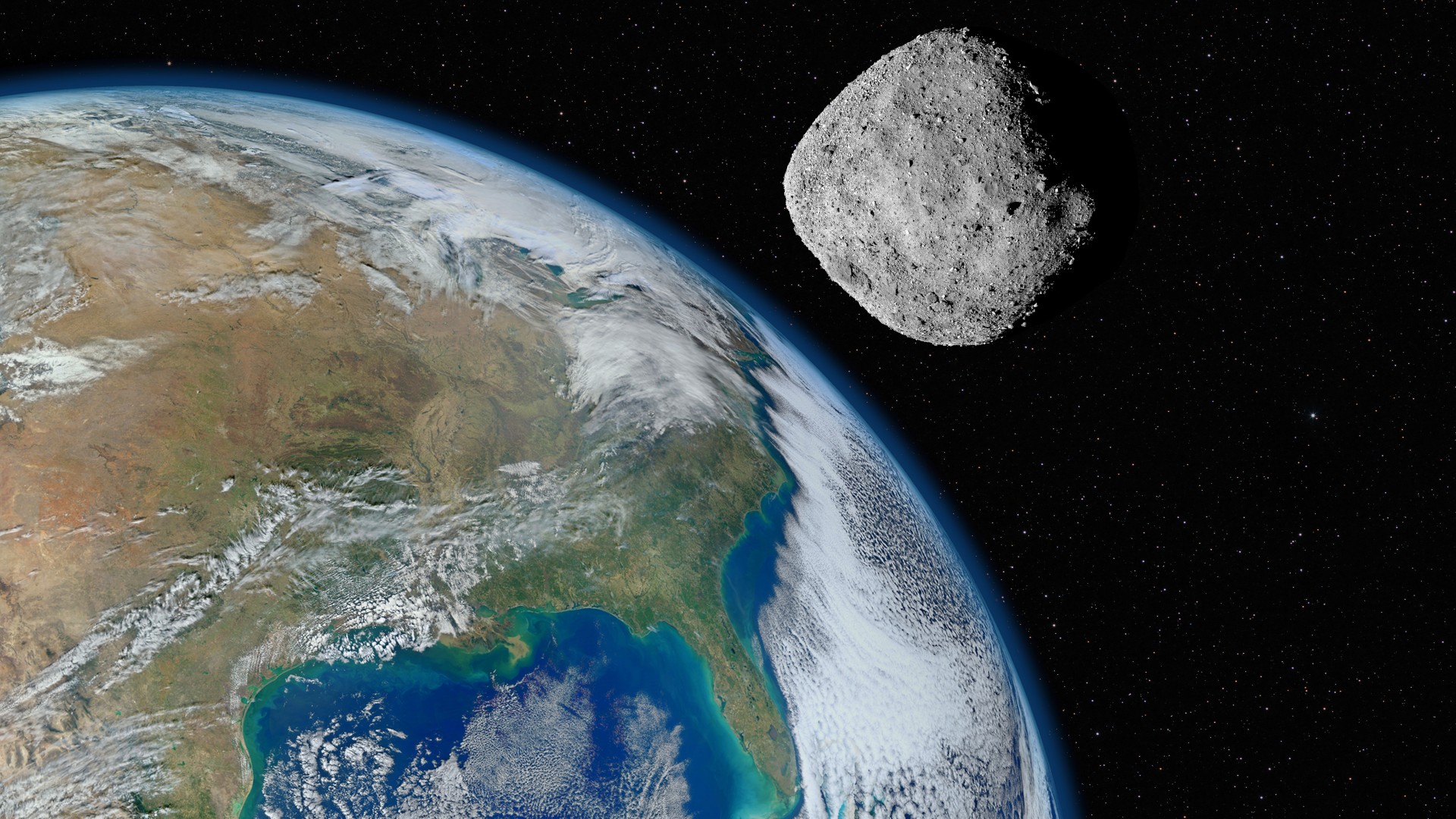Asteroid sample on way to Earth may help answer Big Bang questions
Capsule of dust from Bennu will probably show signs of water and carbon: the building blocks of life

A free daily email with the biggest news stories of the day – and the best features from TheWeek.com
You are now subscribed
Your newsletter sign-up was successful
Material from an asteroid will "come screaming into Earth's atmosphere on Sunday at more than 15 times the speed of a rifle bullet" – but it has all been planned by space scientists, who hope it will answer some of their biggest questions.
Nasa's spacecraft Osiris-Rex will send a small capsule back to Earth carrying a "precious cargo", said BBC News: a "handful" of dust and rock weighing just 250g from a nearby asteroid, Bennu.
The capsule will enter the Earth's atmosphere before drifting to the ground in the Utah desert by parachute. The sample "promises to inform the most profound of questions: where do we come from?", said the broadcaster.
The Week
Escape your echo chamber. Get the facts behind the news, plus analysis from multiple perspectives.

Sign up for The Week's Free Newsletters
From our morning news briefing to a weekly Good News Newsletter, get the best of The Week delivered directly to your inbox.
From our morning news briefing to a weekly Good News Newsletter, get the best of The Week delivered directly to your inbox.
It will contain "material that existed before our planet, maybe even some grains that existed before our Solar System", said Dante Lauretta, the principal investigator on the mission. "We're trying to piece together our beginnings. How did the Earth form and why is it a habitable world? What is the source of the organic molecules that make up all life on Earth?"
Researchers are interested in the 500-metre-wide Bennu because it appears to be "rich in carbon", an element that underpins all life on Earth, and contains traces of water, "another vital ingredient".
Scientists are also interested "for a more immediately relevant reason": self-preservation. Bennu is regarded by Nasa as one of the most dangerous items in the solar system, with about a 1 in 1,750 chance of it colliding with Earth by 2300. Characterising asteroids would help "work out how a looming impact might be averted".
By the time scientists have analysed the material from Bennu, "it is unlikely that any aspect of its formation, evolution and orbital history, composition and components will be unknown", wrote Monica Grady for The Conversation. This will allow an effective “Earth rescue” mission to be launched.
A free daily email with the biggest news stories of the day – and the best features from TheWeek.com
Harriet Marsden is a senior staff writer and podcast panellist for The Week, covering world news and writing the weekly Global Digest newsletter. Before joining the site in 2023, she was a freelance journalist for seven years, working for The Guardian, The Times and The Independent among others, and regularly appearing on radio shows. In 2021, she was awarded the “journalist-at-large” fellowship by the Local Trust charity, and spent a year travelling independently to some of England’s most deprived areas to write about community activism. She has a master’s in international journalism from City University, and has also worked in Bolivia, Colombia and Spain.
-
 Political cartoons for February 20
Political cartoons for February 20Cartoons Friday’s political cartoons include just the ice, winter games, and more
-
 Sepsis ‘breakthrough’: the world’s first targeted treatment?
Sepsis ‘breakthrough’: the world’s first targeted treatment?The Explainer New drug could reverse effects of sepsis, rather than trying to treat infection with antibiotics
-
 James Van Der Beek obituary: fresh-faced Dawson’s Creek star
James Van Der Beek obituary: fresh-faced Dawson’s Creek starIn The Spotlight Van Der Beek fronted one of the most successful teen dramas of the 90s – but his Dawson fame proved a double-edged sword
-
 NASA’s lunar rocket is surrounded by safety concerns
NASA’s lunar rocket is surrounded by safety concernsThe Explainer The agency hopes to launch a new mission to the moon in the coming months
-
 Nasa’s new dark matter map
Nasa’s new dark matter mapUnder the Radar High-resolution images may help scientists understand the ‘gravitational scaffolding into which everything else falls and is built into galaxies’
-
 Moon dust has earthly elements thanks to a magnetic bridge
Moon dust has earthly elements thanks to a magnetic bridgeUnder the radar The substances could help supply a lunar base
-
 How Mars influences Earth’s climate
How Mars influences Earth’s climateThe explainer A pull in the right direction
-
 The ‘eclipse of the century’ is coming in 2027
The ‘eclipse of the century’ is coming in 2027Under the radar It will last for over 6 minutes
-
 NASA discovered ‘resilient’ microbes in its cleanrooms
NASA discovered ‘resilient’ microbes in its cleanroomsUnder the radar The bacteria could contaminate space
-
 Artemis II: back to the Moon
Artemis II: back to the MoonThe Explainer Four astronauts will soon be blasting off into deep space – the first to do so in half a century
-
 The mysterious origin of a lemon-shaped exoplanet
The mysterious origin of a lemon-shaped exoplanetUnder the radar It may be made from a former star